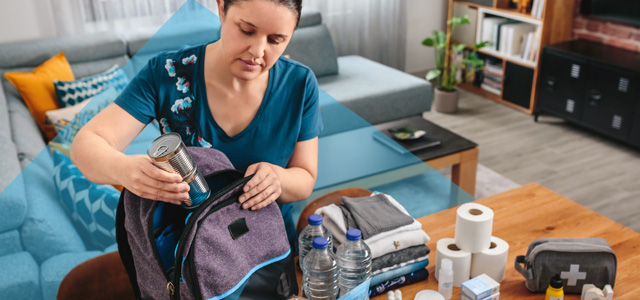
Hurricane Season: Be Prepared, Not Scared
When a hurricane is on the way, it’s natural to feel worried. But don’t let fear stop you from getting ready. With a little planning, you can make sure you and your family stay safe and healthy, no matter what the storm brings.
Make a Plan
The key to hurricane preparedness is having a plan. Gather your family and go through these important steps:
- Know Your Evacuation Zone – Find out if you live in an evacuation zone. This information is usually available on your city or county’s emergency management website. If you do need to evacuate, know your routes and have a backup plan in case your main route is blocked.
- Plan for Medical Needs – Make sure you have enough of your prescription medications to last at least 2 weeks. Also, get copies of your medical records and a list of your current medications, dosages, and healthcare providers. If you use medical equipment that requires electricity, have a backup power source ready. In addition, it may be helpful to have a cooler and ice for medication that requires refrigeration. Know of emergency centers for unique needs such as dialysis. Find ways to manage stress during an event because anxiety can make medical conditions worse.
- Gather Supplies – Build an emergency kit with:
- Water (1 gallon per person per day for at least 7 days)
- Non-perishable food for at least 7 days
- Manual can opener
- Flashlights and extra batteries
- Battery-powered or hand-crank radio
- First aid kit
- Prescription medications
- Cash in small bills
- Copies of important documents
- Decide on an Evacuation Location – Choose a friend or family member who lives outside the hurricane’s path to stay with, or research nearby shelters or hotels that can accommodate your medical needs.
- Make a Communication Plan – Decide how you’ll stay in touch with loved ones before, during, and after the storm. Identify a single point of contact who lives outside the hurricane’s path.
Before the Storm Arrives
If an evacuation order is issued for your area, don’t wait – leave as soon as possible. Waiting until the last minute can be very dangerous.
If you don’t live in an evacuation zone, stay inside a well-built structure. Avoid windows, and be prepared to shelter in a small, interior room to stay safe from high winds.
If the power goes out, use your emergency supplies. Extend your phone’s battery by limiting use to only the most important calls. And never use a generator, grill, camp stove or other gasoline, propane, natural gas or charcoal-burning devices inside your home or garage – this can lead to dangerous carbon monoxide buildup.
After the Storm
Once the hurricane has passed, it’s time to assess the damage and get the help you need.
- Check on Your Home – Carefully inspect your home for any structural damage, leaks, or other issues that could make it unsafe. If you have any doubts, contact a professional for an inspection.
- Restore Power Safely – If the power is out, only use generators, grills, etc. outdoors and far away from windows, doors, and vents that could allow carbon monoxide to come indoors.
- Replace Medications – If you lost any prescription medications, contact your doctor or pharmacy right away to get refills.
Stay Informed
To stay up-to-date on hurricane preparedness and response, follow these reliable sources:
- Ready.gov – Hurricane preparedness tips for people with disabilities from the U.S. government
- CDC Emergency Preparedness and Response – Hurricane tips and resources from the Centers for Disease Control and Prevention
- American Red Cross Hurricane Safety – Checklists, guides, and more from the American Red Cross
Remember, being prepared doesn’t mean being scared. With the right plan in place, you can weather any storm and keep yourself and your family safe. Stay strong, stay resilient, and stay safe.
